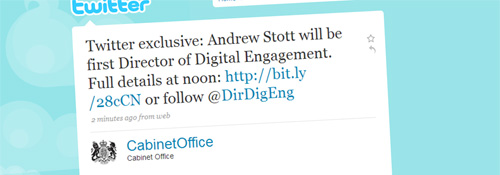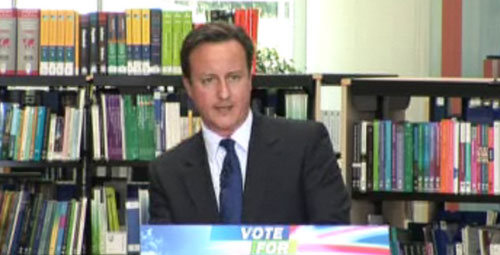
Well, we didn’t see that one coming, did we? The Cabinet Office ultimately plumped for an internal candidate in its search for a Director of Digital Engagement; Andrew Stott has worked there since September 2004. The new role was ‘created to take forward the Power of Information agenda’, the press release helpfully notes; but in his existing (former?) role, Stott already has/had ‘director-level oversight within the Cabinet Office for the Power of Information work from its inception and was a member of the Minister for Digital Engagement’s Power of Information Taskforce.’ So very much the ‘continuity candidate’, you might say.
The job description for the role (which I’ve reproduced here) called for ‘someone who would be acknowledged by their peer group to be a leader in this field. The successful candidate,’ it said, ‘will have a CV that creates instant credibility and confidence with Ministers, senior officials and digital communicators in Whitehall.’
Sadly, ‘instant credibility’ isn’t the reaction I’ve heard from most of my own contacts. One, on promise of anonymity, called it a ‘spectacular own goal’. Others have been more measured in their language; others much, much less. Several of the responses frankly aren’t printable.
There’s no question
I’ve been pointed towards the ‘Information Matters’ strategy published last year by the Knowledge Council, chaired by Stott. Not a document I’ve yet read myself; but Public Sector Forums did, and weren’t impressed – ‘consisting largely as it does of top-down dictums, much reinventing of wheels and what Basil Fawlty would aptly call the bleedin’ obvious.’ (Link for PSF members only)
However, COI’s Andrew Lewin offers grounds for optimism. ‘A new face from the private sector to make a bold splash and shake everything up… wasn’t a very appealing prospect,’ he writes. ‘[Stott is] certainly very familiar with the government scene in the online engagement areas and will be hitting the ground running. This appointment means we should be able to get on with things, but with a high profile person at the head of things to drive it forward still faster.’
And Will Perrin, who knows him from the Power Of Information taskforce, says he is ‘exactly what [the role] needs: responsible, reliable, non political, strong on delivery great with the tech’.
Stott is a brave man, not just because the Daily Mail is against him from day one. If he is to meet the sky-high demands of the role, he needs the active support of the many web-literate civil servants, and the wider ‘gov 2.0’ community. His is not the appointment to win that support instantly, by default. If he is to lead a process of national digital engagement, he first needs to engage with the guys who will actually make it happen.
Oh… and a quick PS: No, I didn’t apply for it. It struck me – rightly, I’d now suggest – as a talking role, rather than a doing role. I’m enjoying the freelance lifestyle too much. I don’t miss the bureaucracy, not in the slightest. I don’t want to be full-time in central London just now. And frankly, there’s too big a political risk attached to the position.



 Just announced by the Cabinet Office: Cabinet Office man Andrew Stott, Deputy Government CIO and chair of the
Just announced by the Cabinet Office: Cabinet Office man Andrew Stott, Deputy Government CIO and chair of the